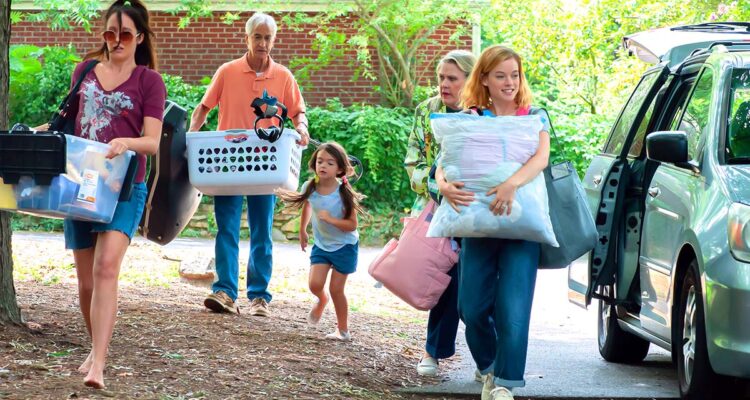Roger Ebert once wrote, “just because something is not done anymore doesn’t mean it’s not worth doing,” when describing Norman Jewison’s irrepressible romantic comedy “Only You.” This same sentiment can be applied to Angus MacLachlan’s latest family dramedy, “A Little Prayer,” a welcome throwback to adult-oriented movie fare of yore like “On Golden Pond,” “Fried Green Tomatoes,” or “Passion Fish.” Shot in Winston-Salem, North Carolina, this little miracle of a film features a strong ensemble cast, mordant Southern humor, and sharp insights into the perils and comforts of loving with your whole heart.
READ MORE: 25 Most Anticipated Movies At The 2023 Sundance Film Festival
Like MacLachlan’s previous film, 2005’s “Junebug” — which he didn’t direct but wrote but feels cut from the same cloth— his latest film centers around an average white Southern family in a minor crisis. Their large, beautiful home, surrounded by verdant green trees and manicured lawns, quietly hiding the chaos that lies within.
Lately, the concerns for his two grown children begin to preoccupy the every thought of patriarch Bill (David Strathairn, “Good Night, and Good Luck.” His son David (Will Pullen, “Greyhound”), with whom he runs a sheet metal business, is a veteran dealing with alcoholism and a wandering eye. His daughter Patti (Anna Camp, “Pitch Perfect”) has just left her opioid-addicted husband, again, arriving from Virginia unannounced like a hurricane on a sunny day.
Then there’s his daughter-in-law Tammy (Jane Levy, “Zoey’s Extraordinary Playlist”). A kindred spirit, Tammy and Bill spend mornings together sipping coffee and talking about her past life in Kentucky, the holler. They listen to a mysterious woman in the neighborhood who starts some mornings singing traditional folk songs, although they never manage to find out who she is or where she lives. Their relationship is solely built on found familial love and mutual understanding on an almost molecular level.
Bill and his wife Venida (a hilarious and heartbreaking Celia Weston, “In The Bedroom”) confide in each other as David’s drinking and extramarital relationship quietly affect Tammy, who does her best to find solace in the small pleasures of their home, like cooking good food, packing brown paper bag lunches, and playing with Patti’s young daughter Hadley (Billie Roy, “Candy”). Strathairn and Weston feel every inch the long-married couple. Venida’s caustic humor is a perfect balance to Bill’s penchant for overthinking, over worrying.
After learning of the extent of David’s affair with their employee Narcedalia (Dascha Polanco, “Orange Is The New Black”) from her best friend Bethany (a scene-stealing Ashley Shelton, “The Good Lord Bird”), Bill confronts the woman. His intrusion on her life crosses a line, yet Strathairn finds just the right frequency with his body language and soul-bearing line delivery that even Narcedalia can’t quite deny him her time. Yet she holds her ground, refusing to give into his patriarchal possession of her choices. In Polanco’s hands, Narcedalia blooms beyond the cliched other woman into a complex person who owns her choices — and her mistakes — with dignity and grace.
“You want something to love that’s all yours. You’ve never had children. They don’t belong to you, and they will break your heart,” Bill tells her as he leaves. He has learned this as he tries to help, and in some ways still control, the lives of his adult children. Yet with Tammy, Bill thinks he’s found someone he can predict, and protect. And at first glance, it seems he may be right.
Amidst all this chaos, Tammy remains calm, cool, and collected. Her quiet strength belies her meek exterior. It’s Levy’s expressive face that first breaks through the transfixing foliage in the film’s opening sequence. David lays across her, still in last night’s clothes. Her eyes facing upward, fixed and determined. She arises each morning before him, shares pleasant greetings once he awakens, and they go their separate ways.
Their shattered relationship is broadcast so discreetly by MacLachlan’s deft direction the audience, just like Bill, feels the need to protect her and warn her of David’s indiscretions. When she finally reveals her strength in two heart-wrenching scenes, the tightness of MacLachlan’s script and Levy’s performance come into sharp focus.
It is her relationship with Bill that bookends the film. That first morning Bill sings the old French Christmas hymn “Un flambeau, Jeannette, Isabelle.” It’s a quiet song about the birth of Jesus, the jubilation of the community as they rush to see him, and a plea for silence so the newborn can enjoy his dreams.
The song underscores the film’s final scene as Tammy and Bill share one last quiet walk together, eating lunch from paper bags. Bill’s kindness has meant the world to Tammy, as has her steadfast companionship meant so much to him. Yet, like his own kids, Bill knows Tammy’s life is her own, and she must make her own path and follow her own dreams. All they can do is sit in an easy silence and enjoy the moment. [A-]
Follow along with all our coverage of the 2023 Sundance Film.

